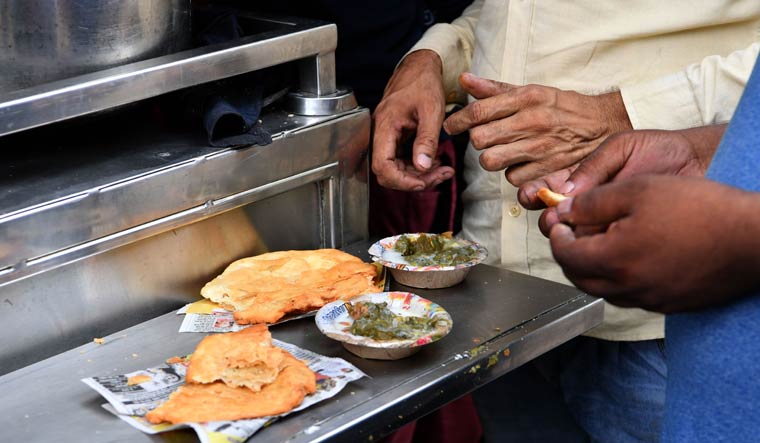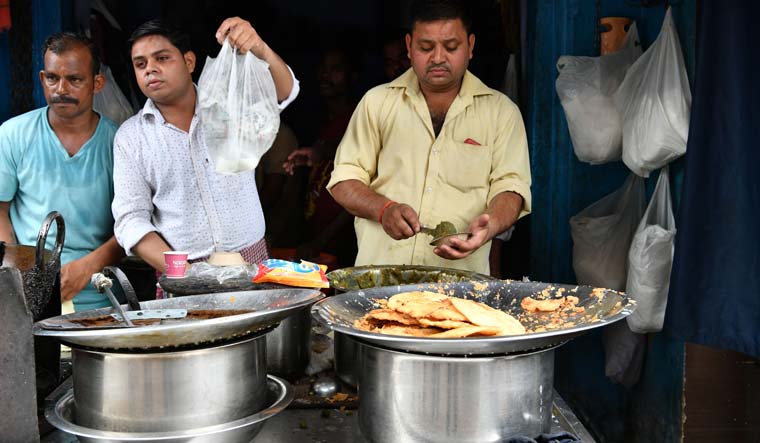Ever since Mukesh Kumar came under the spotlight, his kachoris have lost flavour. “Controversy does not taste good,” he despairs.
According to calculations made by Aligarh’s commercial tax authorities, Mukesh’s small kiosk in a narrow lane of the Nai Basti area has a turnover of Rs 60 lakh. Thus, he must register under the Goods and Services Tax (GST) and pay his dues (a 5 per cent tax is levied on prepared food) every quarter. To the unlettered Mukesh, this is frightening.
“A poor man like me with 15 mouths to feed, how will I survive this cruelty? This is someone’s evil eye at work,” bemoans Mukesh the afternoon we meet. It has been raining intermittently, but there are a dozen customers standing under a battered plastic cover extended beyond the kiosk run by Mukesh, his two younger brothers and three helpers.
A plate of kachori at the outlet comes for Rs 24. Besides two kachoris, a helping of boiled, spicy potatoes and seasoned curd is also offered. In case of takeaways, there are additional charges of Rs 5 for a more generous helping of potatoes and curd. Though the shop remains open between 7am and 4pm, on some days, a complete sell-out causes an early downing of shutters.
 Customers relishing kachoris at Mukesh Kumar's kiosk | Arvind Jain
Customers relishing kachoris at Mukesh Kumar's kiosk | Arvind Jain
Kachoris rank high on north India’s favourite snack list. These small, deep-fried breads come with a variety of fillings (e.g., lentils or peas) and are served with different accompaniments such as mint sauce and pickle. Relished with tea, kachoris also make complete meals.
“Our kachoris are for every age group. The secret lies in the spices we use. We never buy them off the shelf,” says Mukesh.
Despite what appears to be a booming business, Mukesh says that all they make at the end of a day is Rs 5,000. “I cannot tell you how much is put back into the shop. We earn only enough to live from day to day,” he says.
His younger brother, Bhagwan Das, says that selling a perishable food item is hard work. “We start work at 4 in the morning and finish after 10 in the night. The women in the family boil, peel and chop the potatoes but the cooking is our job. Why would we have such a shabby establishment if we were earning in lakhs?” he asks.
One-and-half kilometres away, at the brothers’ narrow three-roomed home at Gular Road, from where they cycle with their wares every morning, neighbours are unwilling to speak about them. “Someone might complain about us as well,” says a neighbour running a provision store.
Mukesh’s father Makhan Lal, 75, is convinced that it was a jealous neighbour who pulled some strings to send the tax authorities their way. “You know how it is. Everyday tiffs with neighbours can become ugly. My daughters-in-law have had some arguments with the women around. The prime minister wants us to sell pakodas. Poor people like us who do that are harassed,” he told THE WEEK.
Ravindra Pal Singh Kauntey, Deputy Commissioner of Commercial Tax (Aligarh range), who was part of the six-member team that examined Mukesh’s business has been stupefied by the attention the case has drawn.
“We acted on a complaint received by the Directorate of Revenue Intelligence, Lucknow. Such cases are never approached without minute preparation. We must act on genuine complaints to curb tax evasion and sustain people’s faith in system. It is a razor-thin edge for us,” he told THE WEEK.
In the narration of Mukesh’s woes, two crucial details have been overlooked. One that the Rs 60 lakh figure is one of turnover, not profit. The second is that the GST is an indirect tax—thus it is the kachori eaters, and not Mukesh, who will bear its burden. Mukesh is a middleman between the customers and the government. This tax (collections for which were Rs 1.06 lakh crore in May 2019) is an important source of revenue and funds for social welfare programmes.
Kauntey says that his team made rather conservative estimates of the business, as they went around on a weekday (assuming there is more business on weekends/holidays) between 2.45pm and 3.45pm—hours which fall outside the peak hours of sale (typically 9am to 2pm). In addition to counting the number of customers (45 and assigning just one plate to each) who came to the shop at that time, the team took a detailed look at many other aspects—for example, unused dough balls, the storage capacity of the drum used for curd and number of gas cylinders available as standby.
Small business establishments with huge turnovers are not a novelty. In October 2018, for instance, a pakoda seller in Ludhiana had revealed hitherto undisclosed income of Rs 60 lakh to the tax authorities.
Udhbhav Pratap Singh, a Lucknow-based company secretary, told THE WEEK, “As most street food vendors conduct their sales in cash, it is almost impossible for authorities to track their genuine turnover. It is a stereotype that most such vendors barely manage to earn a livelihood. Lacuna in tax laws makes their sales go unnoticed.”
also read
- GST collections hit Rs 1.78 lakh crore in March, second highest since roll-out
- GST enforcement body begins action against FMCG majors like ITC, Pepsico and others for tax evasion
- GST collections rise to second highest-ever at Rs 1.72 lakh crore in January
- GST officers detect over 29,000 bogus firms involved in fake ITC caims of Rs 44,000 crore
The Aligarh case has stalled the department’s drive to bring unregistered vendors under the tax umbrella.
Anoop Maheshwari, the Enforcement Head of the Commercial Tax Department (Aligarh zone), told THE WEEK, “There is no human angle in cases of indirect taxes. We conduct awareness programmes to help businesses. No one wants to come under a tax net willingly.”
Meanwhile, in the midst of frying his kachoris to the prefect shade of brown, Mukesh has registered his establishment for a GST number.



